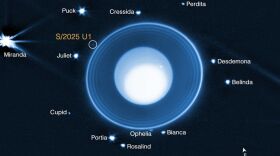-
Idaho Public Television's latest documentary reveals how a local sculptor has immortalized Challenger astronaut Christa McAuliffe in bronze.
-
A new moon has emerged in orbit around Uranus, adding another member to the planet's growing celestial family.
-
Boise is gearing up as space experts come together to explore what it would really take to build a home among the stars.
-
What’s it like to hang in the vastness of space and stare down at the Earth? Well, Astronaut Steve Swanson has a pretty good idea.
-
An interview with Zach Weinersmith, co-author of the new book, A City on Mars. The book is a funny and deeply-researched off-world investigation into the question of space settlement.
-
Take a trip through our solar system with author John Moores as he combines both imagination and science for an unforgettable adventure.
-
Space is a growing industry. Some estimates say there are 12,000 companies involved in the space-tech industry, and those companies will need workers.
-
An interview with Adam Higginbotham, author of Challenger. The book is a thrilling minute-by-minute account of the 1986 Challenger shuttle disaster, based on new archival research.
-
Brian Jackson used drone flight data to analyze Martian weather patterns.
-
Hawthorne Elementary kids in Boise will get a chance to sit down with an astronaut on the ISS and ask questions about space.

Play Live Radio
Next Up:
0:00
0:00
Available On Air Stations










